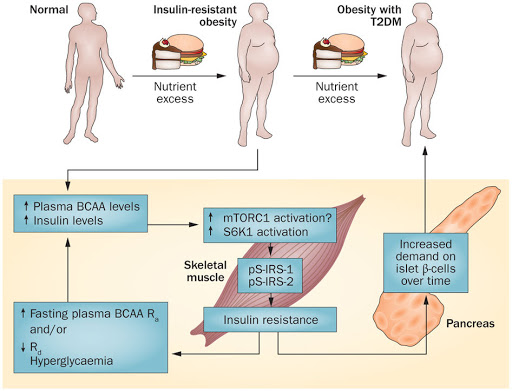
Essential amino acids and essential fatty acids have become popular among nutrition connoisseurs.
Why are they called essential?
Because the human body either lacks the enzymes responsible for producing these, or only produces them in amounts that are less than their requirements.1
This means that these amino acids and fatty acids have to be part of our diet, in adequate amounts, to ensure that we meet our nutritional needs.
Among the essential amino acids, the most popular certainly are the branched chain amino acids or “BCAAs”.
BCAAs have been extensively used in body building and other sports due to their effects in muscle building and fuelling.2,3
Despite their beneficial effects, BCAAs have been shown to promote insulin resistance.4 In addition, it has been shown that diets high in BCAAs lead to hyperphagia (eating more), and subsequently obesity and reduced lifespan.5
Insulin resistance is a cardinal sign of the metabolic syndrome and it has been associated with developing pre-diabetes and diabetes.6 BCAAs have been linked to diabetes, via their indirect effect in promoting insulin resistance.7
However, athletes ingesting BCAAs, do not show signs of insulin resistance.8
As insulin resistance from BCAAs has been attributed to the accumulation of their toxic metabolites, it has been suggested that exercise eliminates the accumulation of these via promoting a differential metabolism of BCAAs.
The take away message is, that if you are active and take BCAAs to improve your performance, then this appears safe, with adverse effects. However, if you are not active, then you may be predisposing yourself to insulin resistance and diabetes.
If you are not sure, what supplements are beneficial for you, book an appointment with one of the accredited practicing dietitians at Nutrigenius that can guide you in how to ensure optimal intake of nutrients to meet your goals and be the healthiest and fittest you ever were.
Stay healthy!
The Nutrigenius Team
1. National Research Council (US) Subcommittee on the Tenth Edition of the Recommended Dietary Allowances. Recommended Dietary Allowances: 10th Edition. Washington (DC): National Academies Press (US); 1989. 6, Protein and Amino Acids. Available from: https://www.ncbi.nlm.nih.gov/books/NBK234922/
2. Zhang S, Zeng X, Ren M, Mao X, Qiao S. Novel metabolic and physiological functions of branched chain amino acids: a review. J Anim Sci Biotechnol. 2017;8:10. Published 2017 Jan 23. doi:10.1186/s40104-016-0139-z
3. Duan Y, Li F, Liu H, et al. Nutritional and regulatory roles of leucine in muscle growth and fat reduction. Front Biosci (Landmark Ed). 2015;20:796‐ Published 2015 Jan 1. doi:10.2741/4338
4. Newgard CB, et al. A Branched-Chain Amino Acid-Related Metabolic Signature that Differentiates Obese and Lean Humans and Contributes to Insulin Resistance. Cell Metab. 2009;9:311–326.
5. Solon-Biet SM, Cogger VC, Pulpitel T, et al. Branched chain amino acids impact health and lifespan indirectly via amino acid balance and appetite control. Nat Metab. 2019;1(5):532‐ doi:10.1038/s42255-019-0059-2
6. Insulin resistance is a cardinal sign of the metabolic syndrome and it has been associated with developing pre-diabetes and diabetes.4 BCAAs have been linked to diabetes, via their indirect effect in promoting insulin resistance.
7. Bloomgarden Z. Diabetes and branched-chain amino acids: What is the link?. J Diabetes. 2018;10(5):350‐ doi:10.1111/1753-0407.12645
8. Shou J, Chen PJ, Xiao WH. The Effects of BCAAs on Insulin Resistance in Athletes. J Nutr Sci Vitaminol (Tokyo). 2019;65(5):383‐ doi:10.3177/jnsv.65.383